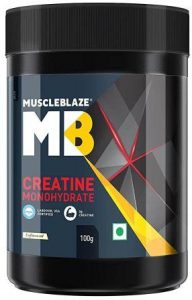Heard a lot about creatine but do not know about its functionality? Do not fret! You are at the right place.
Creatine Monohydrate is a sought-after supplement. It is consumed by athletes and bodybuilders. In current times, powdered supplements are in demand. It is so because of the variety of benefits that these supplements provide.
The main reason why supplements are consumed is because of their efficacy. They are known to boost and stimulate metabolic pathways and the synthesis of nutrients. Therefore, along with high-intensity resistance training, supplements also play a decisive role.
How do you know which supplement will benefit you the most? There are a variety of supplements in the market. Therefore, it can be a tough call to understand if a particular supplement will be helpful for you or not. In this article, we will be giving you an in-depth overview of creatine and how it works.
What Is Creatine?

Creatine is a non-protein compound that is naturally present in our bodies. It is a combination of three amino acids, viz. methionine, arginine, and glycine. It plays an integral role in carrying out various metabolic processes. The reason behind its extensive consumption is that it qualifies to be a good source of energy.
Creatine is a molecule that helps in regenerating ATP. Adenosine Triphosphate or ATP is another organic compound that is often referred to as a molecular unit of currency. ATP stores and provides energy to the cells.
Hence, creatine is highly effective in the conversion of ADP molecules into ATP. It is, therefore, one of the primary reasons why creatine is recommended to be consumed. When one does high-intensity workouts, they require an abundance of energy in their cells.
Creatine ensures just that, by improving your performance. It thereby assists you in completing the training efficiently. Creatine is usually present in seafood like fish and meats.
The Need For Creatine
There are a lot of supplements easily available these days. However, not every product you see needs to be needed by your body. So, do you need creatine? The answer to that can depend on a lot of factors.
Creatine is already present and manufactured by the body. It is stored in the muscles. The need for it arises if you are into high-intensity resistance training and other such workouts.
Doing extensive sports and body-building activities requires a lot of energy. Therefore, creatine should be used as a supplement by those who engage in such activities regularly.
The deficiency of creatine is mostly experienced by those who follow vegan or vegetarian diets. It is so because creatine is mostly found in animal-based food products.
Therefore, if you feel that you qualify for one of the above-mentioned categories, then you might require creatine.
How Creatine Works

Now that you know that creatine is present in our muscles, you might want to know how it works. Creatine promotes the synthesis of ADP into ATP. Adenosine Diphosphate is of no use in supplying energy to the cells.
Creatine generates phosphocreatine, which is functional in the synthesis of ATP. When you are engaging in high-intensity workouts, the stored ATP might get used up rapidly. So, while exercising, the ATP undergoes breakdown into ADP.
The creatine phosphate then converts this ADP molecule back into ATP. It does so by oxidizing and synthesizing proteins, fats, and carbohydrates. Therefore, consuming creatine supplements before a workout can reduce fatigue and increase performance.
Our body already has a good quantity of creatine stored in the muscles. However, the creatine gets used up during rigorous and energy-consuming exercises.
When you work out, the reservoir of creatine phosphate gets consumed. Creatine ensures that when you take a break in between sets, your muscles get replenished with creatine phosphate quickly. Therefore, your efficiency in completing workouts increases.
Benefits Of Creatine
Apart from synthesizing ATP, creatine can also prove beneficial in various other ways. Let us look at the benefits of consuming creatine supplements-
Energy Production
Creatine plays a pivotal role in the production of energy in your muscles. Creatine increases phosphocreatine in your muscles. By doing so, it helps in the reformation of ATP, and, as you know, ATP is crucial in providing energy to the muscles.
Muscle Growth

Creatine helps with muscle gain by improving performance in a single workout. When you tend to have an effective workout with increased repetitions, you will have greater muscle growth.
Creatine is also associated with an increase in cell volume. The increase in cell volume can also lead to improved muscle function. Creatine is also associated with an increase in anabolic hormones. Therefore, all this makes it a favorable supplement to increase muscle growth.
Boosts High-intensity Performance

The production of more ATP means that you will have more energy. So, when you are training, your energy reserves will help you to boost your performance. You will be able to complete your workouts and meet your daily requirements.
Lean Body Mass

Creatine has also been linked to an increase in muscle gain and lean muscle mass. Therefore, this feature of creatine can be instrumental for body-builders and weight-lifters.
Lower Blood Sugar Levels
It improves the glycemic index in people suffering from type-2 diabetes. If you take creatine supplements and engage in aerobic workouts, then you can improve your glucose tolerance. It increases GLUT-4 levels, which is a glucose transporter.
Improve Neurological Processes
It is widely used by athletes to increase mass. But, creatine is also known to improve brain function and neurological processes too.
The reason why this happens is attributed to the fact that creatine causes an increase in energy and oxygen. Therefore, it is functional in the brain too, and provides neuroprotection.
Safe To Consume
Creatine is naturally produced in your muscles. Therefore, it is extremely safe to consume. There will be no long-term problems that one might face when consuming creatine.
Therefore, this makes it one of the safest supplements as it hardly has any adverse effects.
Adverse Effects Of Creatine
Even though creatine supplements are considered to be very safe, it would be better if we had a look at some adverse effects.
Weight Gain
When you start consuming creatine, you might see an increase in your weight. The increase in weight could be anywhere from 1kg to 3kg. However, this is just because of the increased amount of water in your muscles.
Creatine is known to have a strong affinity for water. It pulls water into your muscles and can also make you look softer.
Bloating
Overdosage of anything can lead to digestive problems. The same thumb rule applies to creatine. It is imperative to take it in ideal quantities.
Creatine is also known to cause water absorption into muscles. So, all this can deftly lead to bloating and indigestion.
Cramps And Soreness
If you take an increased amount of creatine, it can lead to soreness. It does not affect muscle recovery. So, increasing the dose will not benefit you a lot.
Dehydration
Dehydration due to creatine is again linked to its association with water. It is therefore always suitable to consume creatine along with fluids. So, if you consume it straight or overdose on it, then you will suffer from dehydration.
FAQs
How Long Does It Take For Creatine To Become Effective?
Creatine might start showing you results in about one week or so. It has been noticed that consumption of creatine leads to an increase in weight too. You will start to notice changes in the efficacy of your workouts too.
A marked increase in your performance will be evident after a week or a half.
How To Consume Creatine Monohydrate?
It is suitable to take creatine along with some fruit juices that have simple sugar bases. It is so because glucose will push your muscles to have a spike in levels of insulin. The spike in insulin will stimulate creatine uptake in your muscles.
Therefore, it will ensure that your muscles are replenished with it. However, never take it with acidic juices.
When To Consume Creatine?
Creatine should be consumed during workouts or post-workout. It is so because this will ensure that you do not suffer from nausea. Moreover, it will help to reduce fatigue and provide the lost energy back to your cells and tissues.
It is suitable to take 3-5g of creatine monohydrate every day. However, this depends mainly on the body weight of an individual. A recommended dose of 0.3g per kilogram will be sufficient.
Does Creatine Lead To Water Retention?
The short answer is no. Creatine does not lead to water retention in the body as such. It is just that when you consume creatine, it absorbs water into your muscles.
However, even if it leads to fluid retention, it is not a cause for grave concern.
Does One Need To Load Creatine?
The straightforward answer to this question is no. Loading creatine means consuming a large amount of creatine to increase storage. However, loading creatine is not very imperative. But, if you follow a vegan diet or a vegetarian diet, then you should do this.
Conclusion – The Bottom Line
Creatine is, therefore a good supplement if you engage in high-intensity workouts and resistance training. It can provide you with greater bouts of energy during repetitive sets.
If you are into bodybuilding, then you might now consider purchasing creatine supplements along with your protein supplements. However, it is imperative to take advice from your trainer before trying out new supplements.
Consuming creatine is overall safe with almost no side effects if you take all the necessary measures and follow the guide carefully. Have you ever consumed creatine? Let me know your experience.


